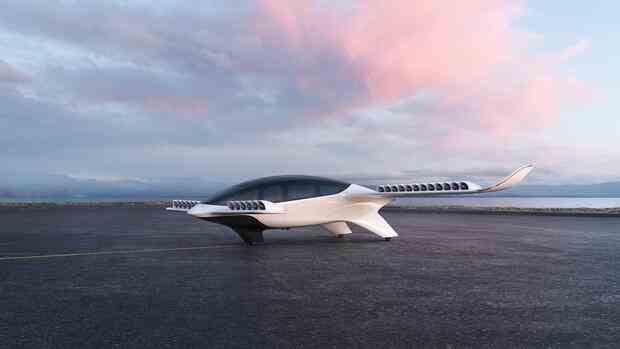tubingen Daniel Wiegand, co-founder of the air taxi start-up Lilium, does not want to be thrown off course despite all the adversities. “We have started to build molds for the first production aircraft for certification,” said the entrepreneur, who is responsible for innovation in management, the Handelsblatt. The manned maiden flight is planned for the second half of next year – with a pilot on board. “We will work with up to six aircraft for the certification. This phase will last about a year and a half.”
Wiegand leaves no doubt that the electric vertical take-off with its 30 encased and tilting rotors will take off. The current demonstrator has just reached the full speed of 250 kilometers per hour for the first time.
Funding remains a problem. “We’re about $300 million short of the manned maiden flight,” Wiegand said. Raising money on the stock exchange is currently impossible. The share price has lost over 90 percent since the IPO in September 2021.
On Tuesday, the company informed its shareholders of the current status by letter. After that, Lilium still had 206 million euros in liquidity at the end of 2022. For the first half of 2023 alone, the company is planning a budget of 125 million euros, so the money would only last for just under a year.
“We are currently in talks about a new round of financing. We are also talking to the authorities about possible state funding for technology,” said Wiegand. From the first flight of the aircraft, the company then wants to finance itself through the income from the sale of aircraft to fleet operators and down payments from customers.
Hype about air taxis is gone
Along with Volocopter from Karlsruhe, Lilium is the flagship project when it comes to electric high-flyers. But the hype surrounding the flying taxis is gone. Aviation enthusiasts often had to accept promises and broke their own schedules.
Wiegand’s team also had to take a lot of criticism. Experts warned that the many folding rotors would consume much more energy when starting than those air taxis that rely on permanently installed large rotors. There won’t be enough batteries for that in the foreseeable future.
>>Read also: Batteries for air taxis: Start-up Customcells receives fresh capital for growth plans
However, Lilium wants to prove otherwise. Just outside of Tübingen, Customcells, Lilium’s partner, is working flat out to ramp up the production of battery cells. The company plans to deliver thousands of these to Lilium every year in the future. There – in Wessling near Munich – the batteries are finally assembled. They are the batteries that the production jet needs. It can no longer fly like the demonstrator with forklift batteries. He needs more power.
They’re supposed to deliver the new cells. They have an output of 330 watt hours per kilogram. The cell technology was developed by the US company Ionblox, which previously operated under the name Zenlabs Energy. Lilium has a stake in the company.
Customcells and Lilium have optimized the technology using the so-called pre-lithiation process.
(Photo: Customcells)
Ionblox uses silicon dominant anodes. They enable high-performance rechargeable batteries, which are said to have 50 percent more energy density than current lithium-ion batteries, and also five times the performance. The batteries can also be charged very quickly.
Customcells and Lilium have optimized this technology – through the so-called pre-lithiation process. Additional lithium is added to the cell. This reduces the loss of lithium that occurs during the first charging cycle. The battery should not age so quickly.
“In external verification lab tests, the battery performed better than expected,” Wiegand said. After 800 charging cycles, a capacity of 80 percent was still expected, but it was actually 88 percent.
Together with Lilium, we have succeeded in demonstrating the feasibility of series production of high-performance lithium-ion batteries for electric high-flyers, said Dirk Abendroth, CEO of Customcells: “Now we are automating our production step by step to large quantities.” In order to meet the increasing demand from To cover Lilium, Customcells wants to invest a three-digit million amount and build a gigawatt system.
Criticism of Lilium is becoming quieter
In the face of such successes, criticism of Lilium has softened. Volker Gollnick, head of the Institute for Air Transport Systems at the Hamburg University of Technology and one of Lilium’s most vehement critics, is now “cautiously optimistic” about the project, as he recently told the news magazine “Der Spiegel”.
Wiegand is confident that the batteries manufactured by Customcells can meet the requirements of the aviation authorities. “The mandatory reserve is taken into account in the operational range of 175 kilometers,” he said. The reserve will not be a specific performance value of the battery. It depends on where the jet is flying to and how far away alternative airports are.
Lilium deliberately chose a partner from Europe for the battery. “We want short distances in order to achieve the necessary pace of innovation. And we need very high quality and reliability.” The battery is one of the most important elements of the jet. “It determines flight performance, but also economics and safety. We have defined aviation batteries and their approval as our core competence.”
The first production aircraft are now to be equipped with a four-man VIP cabin and go to established operators who, for example, have a helicopter fleet. Lilium is thus following the Tesla model of first serving the premium segment and then using this income to finance entry into mass business. “Of course, we see far greater potential in regional transport between cities. The shuttle is the next step,” says Wiegand.
Aside from the financing, this is likely to be the biggest challenge for the Lilium team, because a sufficiently large network for regional transport between cities must be set up.
More: Air taxi pioneer Joby wants to expand focus to Germany – short sellers attack company
